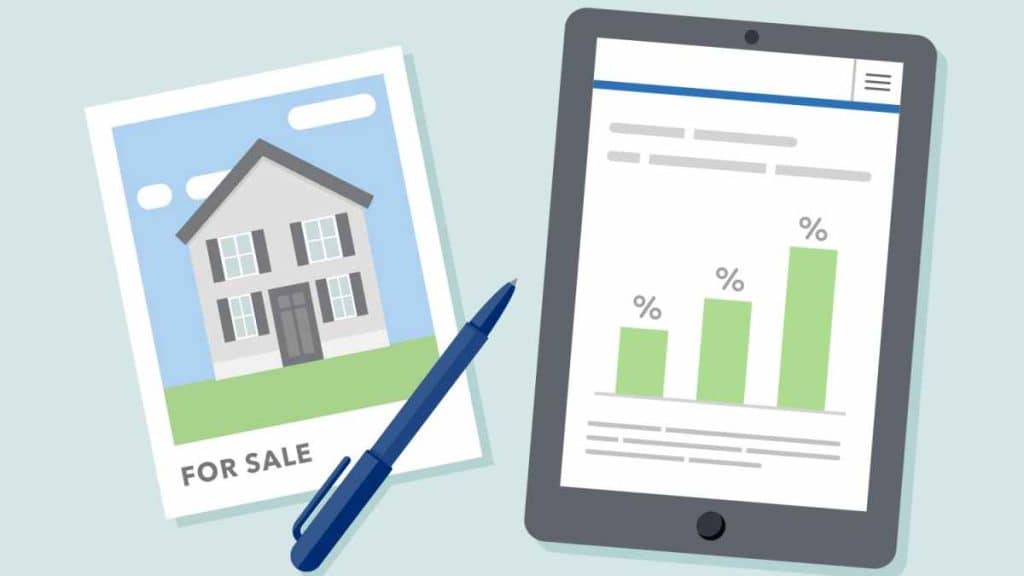When interest rates are high, it means that it is more expensive for borrowers to take out a mortgage as the total mortgage cost will be higher. This may in turn reduce the demand for purchasing a home as fewer buyers are able to enter the property ladder.
What are Interest Rates?
Interest rate is the amount of money paid on top of a principal amount when taking out a loan or mortgage; whether you have a 1000 dollar loan or a mortgage for many hundreds of thousands of dollars.
It is paid regularly and at a particular rate, which could be fixed or variable depending on the mortgage and the lender. Always remember though that if you do not make the necessary payments on any form of finance; including the interest payments, you may find that you negatively affect your credit rating and may lead you to having bad credit, which will harm your chances of borrowing money in the future.
Interest rates will be determined by multiple factors and will also be impacted by the current economic state of a country.
Lenders look to the country’s central bank in order to determine interest rates and fees for their loans. When there is high inflation, banks will typically increase interest rates as a means of regulating economic growth. This means that lenders will increase their interest rates and it will be more expensive to borrow money.
Do interest Rates Impact the Housing Market?
When there are high interest rates, it becomes more expensive for people to purchase a home as it becomes less affordable to borrow. Conversely, when interest rates are lower, it is easier to buy and sell. Generally speaking, if mortgage rates are high, frewer people can afford to enter the property ladder because all properties become less affordable and more people will be inclined to sell their properties fast, as mortgages become increasingly expensive and unaffordable.
High interest rates also affect sellers as it makes it more difficult for them to sell their properties. If borrowers are finding it too expensive to qualify for a mortgage, they will not be able to buy properties. This means that if you are trying to sell during periods of high interest rates, your normal asking price may be out of range for many potential buyers. The alternative is for sellers to lower their asking price but that means missing out on potential profit and impacts what they could go on to buy.
In periods of fast economic growth, the impact of rising interest rates on mortgages should only have a negligible effect on the housing market because when there is growth, salaries and wages usually increase to compensate for the rising interest rates. This, in turn, means that the housing market would be stabilised.
How are Mortgages Impacted by Increased Interest Rates?
Mortgages become more expensive when interest rates increase and consumers will have to pay more overall for their mortgage, making it less affordable for consumers to purchase a home.
This could have a negative impact on the housing market as it is likely that there will be a decrease in demand for properties as fewer people can afford to buy. In response, sellers will have to wait to sell or lower the price of their homes in order to encourage buyers.
For mortgage providers, rising interest rates can be both a good and bad thing. When interest rates are high, they will be making more profit from the sale of their mortgages; however, that said, if the interest rate is too high it will deter borrowers and mortgage lenders may suffer from a lack of demand.
What do Rising Interest Rates Mean for those who Already own a Home?
When interest rates are high, borrowing becomes more expensive; however, this will not affect all homeowners. In fact, the only homeowners that will be affected are those that currently have a variable rate mortgage.
Only around one third of UK adults currently have a mortgage; the remaining percentage are made up of those who rent, those who have already paid off their mortgage or those who never had a mortgage to begin with. The majority of those with an active mortgage are on a fixed-rate mortgage (74%) meaning that they will be immune to the effects of rising interest rates.
What Happens if I have a Fixed Rate Mortgage?
If you have a fixed rate mortgage on your property and interest rates rise, you will remain unaffected during the course of your mortgage fix. However, once your mortgage term ends however, you will be susceptible to interest rate rises. For example, if you have a mortgage, fixed for 3 years, even if interest rates rise considerably over the course of your fix, you will pay the same amount, agreed from the outset.
For people with a variable or tracker mortgage, an interest rate rise will directly and fairly quickly affect you. There are of course advantages to having a tracker and non-fixed mortgage, as if rates drop at any point, those with fixed mortgages will not benefit from the rate cut, whereas those with variable and tracker mortgages will.

